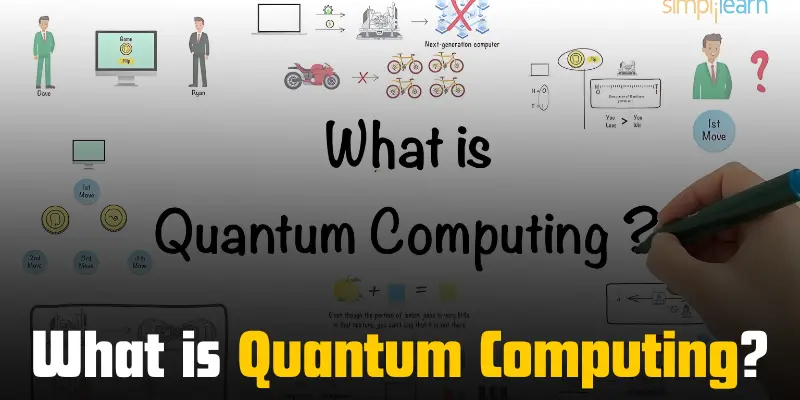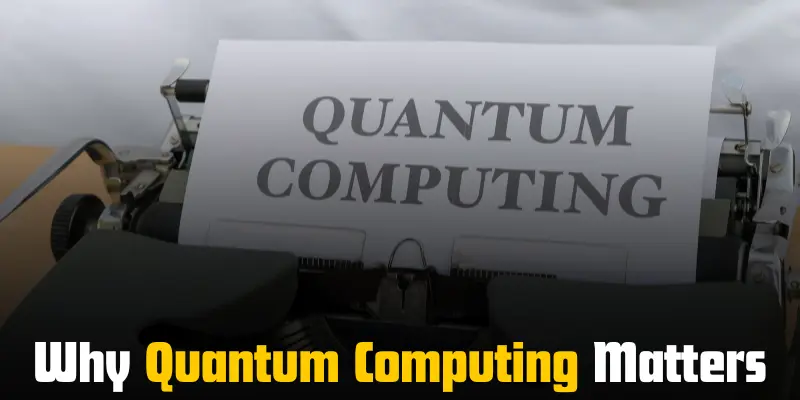Quantum Computing for Beginners: What It Is and Why It Matters
Published: 11 Mar 2025
Introduction
Quantum computing is a new type of computing that uses the strange rules of quantum mechanics to solve problems in ways that regular computers can’t.
Unlike classical computing, which uses bits to process information as either 1 or 0, quantum computing uses quantum bits, or qubits. Qubits can be both 1 and 0 at the same time, thanks to a property called superposition. This allows quantum computers to perform many calculations at once, making them incredibly powerful for certain types of tasks.
While classical computers are great for everyday tasks like browsing the internet or running applications, quantum computing for beginners can open up new possibilities in solving problems too complex for today’s technology.
The importance of quantum computing for beginners is clear: it has the potential to change the way we solve problems in fields like healthcare, climate science, and even cybersecurity. As quantum computers develop, they might help us tackle challenges that are currently unsolvable.
What is Quantum Computing?

Simple Definition
- Quantum computing is a new type of computing that uses qubits instead of regular bits.
- Unlike classical computers that process information in a simple on/off (0 or 1) way, quantum computers can handle information in multiple states at once, making them much more powerful for certain tasks.
Classical vs. Quantum Computing
- Classical Computers: Regular computers (like the one you’re using) store data in bits that are either 0 or 1.
- Example: Imagine a light switch. It’s either on (1) or off (0).
- Quantum Computers: These computers use qubits, which can be both 0 and 1 at the same time. This is called superposition.
- Example: Think of a spinning coin. While it spins, it’s both heads and tails at the same time, like a qubit in superposition.
Real-World Example
- Imagine trying to solve a maze.
- Classical Computers: They would try one path at a time, checking each until they find the right one.
- Quantum Computers: They could explore all the paths at once, finding the right solution much faster.
This analogy helps visualize how quantum computers can handle many possibilities at the same time, giving them a big advantage over classical computers in some tasks.
Understanding the Basics
Classical vs. Quantum Computing
- Classical Computers: These are the computers we use every day, like laptops or smartphones. They process data in bits, which can only be 0 or 1.
- Quantum Computers: Instead of bits, quantum computers use qubits. A qubit can be both 0 and 1 at the same time, thanks to superposition.
Example:
- In a classical computer, think of a light switch. It’s either on or off—just like a bit can be 0 or 1.
- In a quantum computer, imagine a light that can be on, off, or somewhere in between, all at once—just like a qubit that can be in multiple states.
What are Qubits?
- Building Blocks of Quantum Computing: Qubits are the heart of quantum computers. They’re like the bits in classical computers but much more powerful.
- Superposition: A qubit can exist in many states at once—both 0 and 1—unlike a regular bit, which is either 0 or 1.
- Example: It’s like flipping a coin. While the coin is spinning, it can be both heads and tails at the same time. When it lands, it’s either heads or tails, just like a regular bit.
How Qubits Work:
- A qubit can represent both 0 and 1 simultaneously.
- This ability to exist in multiple states allows quantum computers to process huge amounts of information faster than classical computers.
Key Concepts in Quantum Computing
Superposition
- What it Means: Superposition is when a qubit can be in more than one state at a time—both 0 and 1.
- Why it’s Important: This allows quantum computers to process multiple possibilities at once, making them faster for certain tasks.
Example:
- Think of a coin spinning in the air—it’s not just heads or tails, but both at the same time. Once the coin lands, it’s either heads or tails, like a regular bit.
- In quantum computing, while the qubit is “spinning” (in superposition), it can represent both 0 and 1 at once, handling more information at the same time.
Entanglement
- What it Means: Entanglement is when two qubits become linked, so the state of one qubit directly affects the state of the other, no matter how far apart they are.
- Why it’s Important: This allows quantum computers to work in a coordinated way, processing information much faster than classical computers.
Example:
- Imagine you have two magic dice. When you roll them, no matter how far apart they are, both dice always show the same number.
- In quantum computing, even if two qubits are on opposite sides of the world, they can still be perfectly linked and share information instantly.
Quantum Interference
- What it Means: Quantum interference is how quantum computers use the wave-like nature of qubits to cancel out wrong answers and amplify the correct ones.
- Why it’s Important: Interference allows quantum computers to solve problems more efficiently by narrowing down the best solution from many possibilities.
Example:
- Imagine waves in water. When two waves meet, they can either add up (constructive interference) or cancel out (destructive interference).
- Quantum computers use interference to combine the right answers (constructive) and cancel out wrong ones (destructive), making their problem-solving faster and more accurate.
Why Quantum Computing Matters

Speed and Power
- How it Works: Quantum computers can solve problems much faster than classical computers because they process many possibilities at once.
- Why it’s Important: For tasks that require testing many solutions, quantum computers can find the best answer in a fraction of the time.
Example:
- Classical Approach: Imagine trying to solve a puzzle by trying every piece one by one. It takes a lot of time to find the right fit.
- Quantum Approach: A quantum computer can test multiple pieces at the same time, speeding up the solution process and solving the puzzle much faster.
Real-World Applications
- Healthcare: Faster Drug Discovery
- How it Helps: Quantum computers can quickly simulate molecules and chemical reactions, speeding up the process of discovering new medicines.
- Why it Matters: This could help find cures for diseases like cancer or Alzheimer’s faster than traditional methods.
- Finance: Improved Algorithms for Trading
- How it Helps: Quantum computing can analyze large sets of financial data and predict market trends more accurately.
- Why it Matters: This could lead to smarter, more profitable trades, and better risk management in the finance world.
- Climate Change: Better Climate Models and Simulations
- How it Helps: Quantum computers can simulate complex climate systems, helping scientists predict future weather patterns and environmental changes.
- Why it Matters: This could lead to better strategies for fighting climate change, improving sustainability and planning.
The Future of Quantum Computing
Current Challenges
- Instability of Qubits: Qubits are very sensitive to their environment. Small disturbances (like temperature changes or magnetic fields) can cause them to lose their information quickly, making it hard to maintain calculations.
- Cost and Resources: Building quantum computers requires expensive materials and advanced technology. The cost of creating and maintaining quantum systems is still very high.
- Technical Complexity: Quantum computers require highly specialized knowledge to build and operate. The technology is still in its early stages, so it can be hard for even experts to design reliable quantum computers.
What’s Next?
- Improved Stability: Scientists are working on making qubits more stable and less affected by their surroundings. Advances in error correction will also help keep calculations accurate.
- Wider Adoption: As technology improves, quantum computers will become more accessible, possibly leading to smaller, more affordable systems that can be used by businesses and researchers.
- Impact on Industries: Over the next decade, quantum computing could revolutionize industries like healthcare (faster drug discovery), finance (better algorithms), and climate science (improved simulations for predicting future changes).
- Breakthroughs in AI: Quantum computers could dramatically speed up machine learning, leading to breakthroughs in artificial intelligence, making it smarter and faster.
Conclusion
So guys, in this article, we’ve covered Quantum Computing for Beginners in detail. Quantum computing is an exciting field that promises to change the way we solve complex problems in the future.
If you’re curious about how it works or want to explore more, I recommend diving deeper into online courses or reading books that simplify the subject. Stay ahead of the curve and keep exploring this fascinating topic. Ready to dive into the quantum world? Start your journey today!
Frequently Asked Questions (FAQs)
Quantum computing is a new type of computing that uses qubits instead of regular bits. Qubits can exist in multiple states at once, making quantum computers faster for certain tasks. They have the potential to solve problems that regular computers can’t handle in a reasonable time.
Regular computers use bits to process information, which are either 0 or 1. Quantum computers use qubits, which can be 0, 1, or both at the same time (thanks to superposition). This allows quantum computers to process much more information at once and solve problems faster.
Qubits are the building blocks of quantum computers. Unlike regular bits, which can only be 0 or 1, qubits can represent both 0 and 1 simultaneously. This ability helps quantum computers perform many calculations at once, speeding up problem-solving.
Superposition is the ability of a qubit to exist in both 0 and 1 states at the same time. This is like a spinning coin that is both heads and tails at once. Superposition allows quantum computers to explore many possibilities in parallel, which increases their computational power.
Quantum entanglement happens when two qubits become linked, so the state of one qubit directly affects the other, no matter how far apart they are. This means that changes to one qubit will instantly impact the other. It allows quantum computers to work in a coordinated way for faster processing.
No, quantum computers are not faster for all problems. They are particularly powerful for tasks that involve large amounts of data, like optimization, simulations, and cryptography. For many everyday tasks, classical computers are still the better option.
Quantum computers are still in development and not widely available to the public. However, companies like IBM and Google have created cloud-based quantum computing platforms that allow researchers and developers to experiment with quantum algorithms. It’s an exciting time, but we’re still waiting for quantum computers to be more practical and affordable.
Quantum computing can simulate molecules and chemical reactions more quickly than classical computers. This could speed up drug discovery, making it easier to find new treatments or cures for diseases. It can also improve medical imaging and diagnostics by processing complex data more efficiently.
Bonus Points
- Quantum Supremacy: Quantum supremacy refers to the point where quantum computers can solve problems faster than the most powerful classical computers. This milestone shows that quantum computing has real-world potential.
- Quantum Algorithms: Quantum computers use special algorithms designed to take advantage of their unique capabilities. One example is Shor’s algorithm, which can factor large numbers much faster than classical algorithms.
- Quantum Encryption: Quantum computers could revolutionize encryption by making it possible to create virtually unbreakable security systems. Quantum encryption relies on quantum principles like entanglement to ensure data is transmitted securely.
- Quantum Hardware: Building quantum computers requires extremely cold environments to keep qubits stable. Companies are developing hardware like superconducting qubits and trapped ions to make quantum systems work reliably.
- Quantum Cloud Computing: Some companies, such as IBM and Google, offer cloud-based quantum computing services. This allows developers to run quantum algorithms without needing to own expensive quantum hardware.
- Quantum Simulation: Quantum computers can simulate physical systems like molecules or materials, helping scientists make breakthroughs in chemistry and physics. This could lead to new materials or energy solutions.
- Quantum Machine Learning: Quantum computers can accelerate machine learning tasks by processing large datasets more efficiently. This has the potential to speed up AI development, making it smarter and more capable.
- Error Correction: Since qubits are very sensitive to their environment, quantum error correction is crucial to ensure that quantum computations are accurate. Researchers are working on developing methods to correct errors without slowing down the system.
- Quantum Networking: Quantum networking could lead to the creation of quantum internet, where information is transmitted using quantum entanglement, offering faster and more secure data transfer.
- Ethical Implications: As quantum computing advances, it may challenge current encryption methods, raising concerns about privacy and cybersecurity. It’s important to address these ethical issues as the technology develops.

- Be Respectful
- Stay Relevant
- Stay Positive
- True Feedback
- Encourage Discussion
- Avoid Spamming
- No Fake News
- Don't Copy-Paste
- No Personal Attacks

- Be Respectful
- Stay Relevant
- Stay Positive
- True Feedback
- Encourage Discussion
- Avoid Spamming
- No Fake News
- Don't Copy-Paste
- No Personal Attacks



